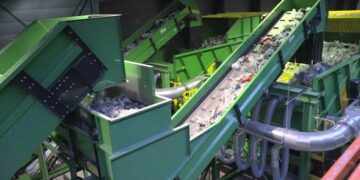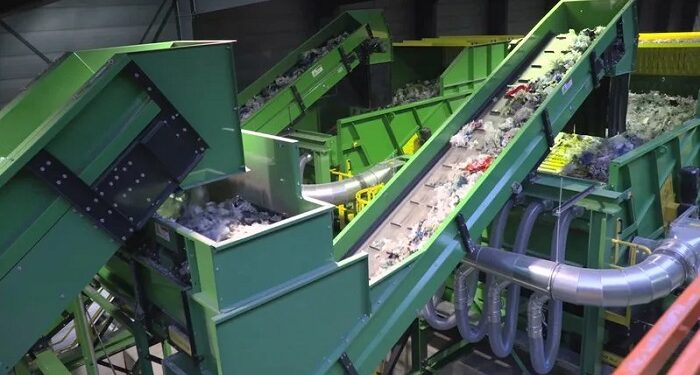Recycling can seem hard in today’s cities, where space is limited. However, new solutions are coming to help with electronic waste recycling. These efficient urban recycling solutions make processing materials easy and help the planet. By using compact recycling tools, people in cities can help the environment and make recycling simple.
This approach ensures a cleaner, greener future for everyone. Companies can play a crucial role in this by offering comprehensive recycling services.
Understanding the Importance of Recycling in Urban Environments
Recycling is key to keeping cities green as they grow. More people mean more trash. Cities need strong recycling to handle this waste, especially electronic waste. Without it, trash piles up, harming people and the environment.
The Growing Need for Waste Management
Cities are crowded and face big challenges with waste. They make a lot of trash every day. Good recycling is a must to deal with this. Businesses that adopt green practices set a positive example for others.
Recycling helps reduce landfill use and save resources. It is vital for a green economy, as it ensures that recyclables are used again.
Environmental Impact of Waste in Cities
Too much waste in cities harms the planet. Full landfills pollute air and water, hurting the climate and resources. Electronic waste is a significant contributor to these full landfills. Bad waste management also makes cities unhealthy.
Good recycling reduces waste and keeps materials from being wasted, which is essential for any business focused on sustainability. It fights pollution and saves nature. Recycling makes cities better places to live.
Urban Recycling Solutions for Limited Spaces
Urban areas have special challenges with waste management, especially in small spaces. New recycling solutions have come up. Thanks to user-friendly services, they help people recycle more and fit it into their busy lives. These solutions also make communities more sustainable and aware of the environment.
Innovative Techniques for Small Space Recycling
To help with recycling in cities, new methods have been developed for e-waste recycling. Some key ones are:
- Vertical Gardening: This lets people recycle food waste in vertical gardens, which can even fit on small balconies or yards.
- Modular Recycling Bins: These small recycling bins can handle different types of waste but take up little space.
- Shared Recycling Stations: Having recycling spots for everyone to use helps people work together and collect more waste, providing easier access for customers.
Community Recycling Programs and Initiatives
Community recycling programs are key to better recycling in cities. They often include:
- Education campaigns to teach people how to recycle correctly.
- Working together with local governments and neighborhoods to solve waste problems.
- Recycling events that get everyone involved.
Cities, groups, and people can make these solutions work well by working together. A business model based on shared responsibility can be effective. Recycling in cities is good for the planet and brings people closer together.
Compact Recycling Equipment for City Dwellers
Recycling in cities is tough because there is little space. Luckily, there’s compact recycling gear made just for city folks. These tools make recycling better and encourage more people to recycle.
Types of Equipment Suitable for Small Spaces
There are many kinds of compact recycling gear for small places. Here are some excellent choices:
- Small-scale composters: Great for organic waste, these units manage food scraps well in small spaces.
- Stackable recycling bins: These bins save space and keep recyclables tidy and easily accessible.
- Portable shredders: These shredders are easy to move and shred paper and cardboard, cutting down on waste.
Benefits of Using Compact Recycling Solutions
Using compact recycling gear has many upsides. Some main benefits are:
- Ease of use: These solutions are easy to use, making recycling simple and regular.
- Space-saving design: They fit well in small spaces, helping to keep recycling tidy without taking up too much room.
- Enhanced recycling rates: By making recycling easy, these tools help increase recycling rates and support better recycling habits in cities.
Small Space Waste Management Strategies
Managing waste in small urban spaces is tough, especially in apartments with limited space. Smart waste management can boost recycling rates and help with efficient recycling. To make the most of recycling, it’s key to have a well-organized recycling area.
Maximizing Recycling Potential in Apartments
Here are ways to boost recycling in apartments:
- Categorize waste: Keep recyclables separate from other trash. This makes recycling easier.
- Use clear labeling: Labels help everyone know where things go. This cuts down on mistakes.
- Create incentives: Make recycling fun by offering rewards or competitions.
Tips for Setting Up a Home Recycling Station
Here are tips for a good home recycling station:
- Select the right containers: Pick bins that fit well and are easy to see. Make sure they’re for different materials.
- Establish a routine: Sort and take recyclables out at the same time every week. This makes recycling a habit.
- Maximize vertical space: Use shelves or stackable bins to save floor space. This keeps things tidy without taking up too much room.
These tips help manage waste in small spaces and support recycling in cities. By following these steps, people can help the environment in big ways.
Conclusion
Urban living brings significant challenges, especially with waste management. Cities need new ways to handle their trash, and using compact recycling machines helps a lot.
These machines make recycling easy, even in small spaces. They help make cities greener, and everyone can help by recycling more.
Small actions add up to significant changes in the world. With the right tools and mindset, recycling at home is critical. Our cities need to adopt efficient recycling services.
Recycling is everyone’s job in cities. By following the tips here, we can all make a difference. Together, we can make our cities sustainable for the future.





















